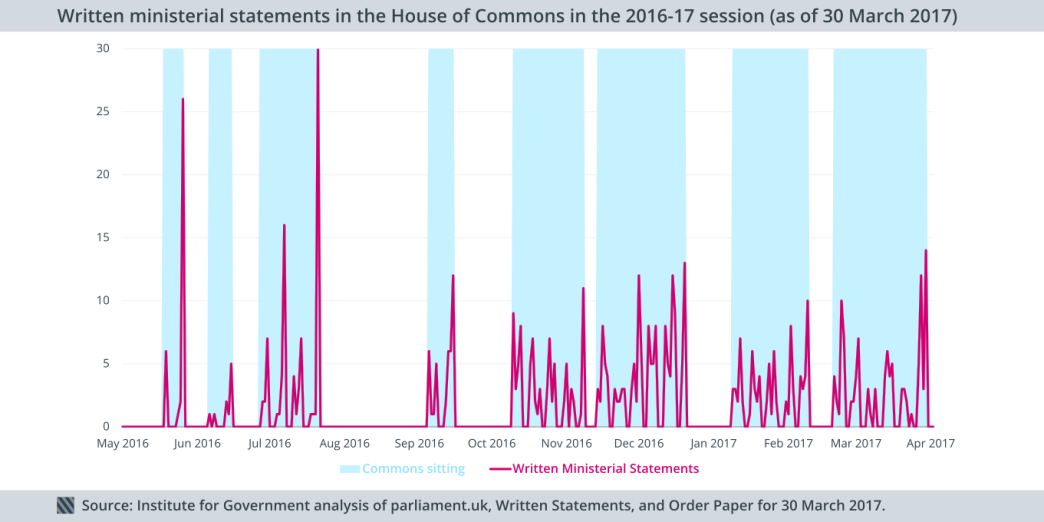It’s time to bin ‘Take Out The Trash Day’
The day, or days, at the start of recess have become good days for government to get out anything it wants to bury. Gavin Freeguard tell us what is in
The day, or days, at the start of recess have become good days for government to get out anything it wants to bury. Gavin Freeguard tell us what is in today’s data dump.
The onset of a House of Commons recess today brings the latest round of governmental fly-tipping as various awkward announcements are dumped on Hansard and GOV.UK.
Today is no different, with no fewer than 14 written ministerial statements.
These include subjects such as:
- consultations on assessment in primary education, and on personal injury damages
- a review of the Personal Independence Payment assessment
- performance targets for important government agencies including the DVLA and Companies House
The order paper also mentions something on Cabinet Committee, but at time of writing this has yet to be published.
For comparisons, there have been 586 written statements in the Commons in the 2016-17 session, an average of 4.4 per sitting day. But the last day of recess always sees a spike (today’s is the furthest right).

The 30 ministerial statements on the last day before summer recess in 2016 included the Schools Funding Formula being delayed by a year, criminal offences and motoring charges dodged by foreign diplomats, patient data being sent to the wrong GPs, the Office for Civil Society moving from the Cabinet Office to the Department for Culture Media and Sport, and departments’ performance in answering (or not) MPs’ letters on time.
Beyond written statements, there’s the data dump on GOV.UK.
Today’s includes:
- spend over £25,000 from the Ministry of Justice and some of its arm’s-length bodies ( which are already late – they’re supposed to be published at the end of the month following the one they contain the data for)
- ministers’ (and special advisers’, and senior officials’) meetings, gifts and hospitality, from more than ten departments.
Details of special adviser names and salaries in 2014 and 2015 were both published on ‘Take Out The Trash Days’. In 2016, government went one better, publishing them the day after the Commons had broken up for Christmas, announced by a ministerial statement only ever made to the Lords, which also updated the Ministerial Code and abolished extended ministerial offices without any evaluation. That same day, three departments – the Cabinet Office, the Department for Work and Pensions and the Home Office – published details of hospitality received by ministers and senior officials.
This undignified part of our constitution needs to be consigned to the dustbin of history.
It creates a stench of secrecy around perfectly normal government activities. Special advisers, for example, are a necessary, important and everyday part of government. Publication of their details should be too. The same goes for the many ministers meetings have with their stakeholders.
There may be more prosaic reasons for publishing government business at the end of a term. Politicians and civil servants are human, after all, and may be trying (like any of us) to finish bits of work before they break. But it can still be counter-productive to publish everything in one go. If you want people to look at, use and improve the statistics you’re publishing (for example, Public Bodies 2016, published on the December 2016 ‘Take Out The Trash Day’), it’s a real waste to put them out with the trash.
Let’s hope we don’t have to recycle this post come 25 May, when the Commons next breaks for recess.
- Topic
- Policy making
- Keywords
- Civil servants
- Publisher
- Institute for Government